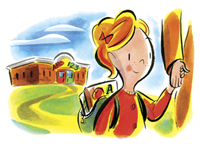Parents and their young children face so many hassles,” laments U of T child development professor Carl Corter. With half-day junior and senior kindergarten, for example, some parents rush from work at lunch to drive their child from morning kindergarten to afternoon daycare.
The First Duty Project, which began in 2002 at five Toronto schools, eliminated this stress by merging daycare, kindergarten and family support. “Childcare workers and teachers worked side-by-side,” explains Corter, the project’s key researcher. Each facility also offered a drop-in centre where parents and their preschoolers could visit. The toddlers could listen to a family support worker read them a storybook. The parents could connect to other services and find out about parenting resources elsewhere in the community. The recently published results show that the integrated program benefited everyone.
● The children made great strides in vocabulary, number knowledge and prereading. With teachers and childcare staff planning activities together, the kids weren’t learning about apples in kindergarten, and learning about apples again at daycare. And since the daycare centre and kindergarten shared the same room, no time was wasted shuffling kids to and fro.
● The parents felt empowered to help their children learn. Staff at the drop-in centres read to the children, and parents felt confident in supporting learning at home.
● The teachers and childcare workers enjoyed better communication with families, more access to program resources and enhanced professional development opportunities.
The success of First Duty has attracted international attention, but it will be difficult to continue the integrated approach in Canada. “It bucks the current system,” explains Corter. “We live in a modular society. Teachers, childcare workers and schools aren’t trained for integration.” The First Duty model, though, is being reflected in Ontario’s Best Start plan, a redesign of early childhood and family support services.






